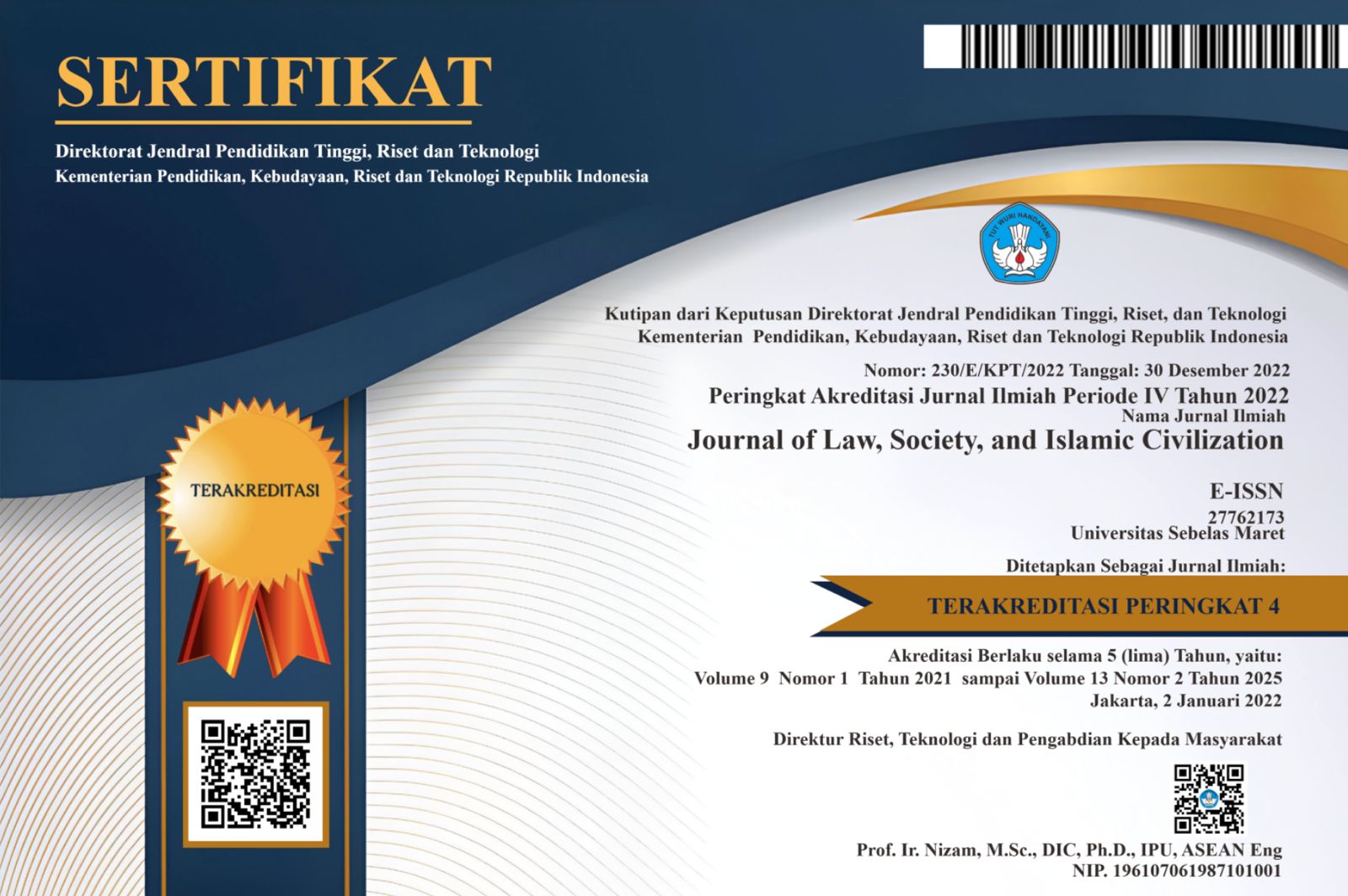Penggunaan Tanda Tangan Elektronik dalam Penyelenggaraan E-Government Guna Mewujudkan Pelayanan Publik yang Efisien
Abstract
This study aims to discuss Electronic Signatures in the implementation of E-Government in order to realize efficient public services to find out how the system and the problems of using electronic signatures of public officials in the implementation of e-government. The method used in this research is a normative research method with a prescriptive nature. The approach in this research is the statutory and conceptual approach. The legal materials used in this study are primary legal materials consisting of legislation and secondary legal materials obtained through library materials. The data analysis technique uses deductive logic. The results of this study indicate that the application of e-government information technology in this case the use of electronic signatures will bring the government to be more efficient and effective in terms of public services as well as administrative processes and internal communications. There are two main legal problems in the use of electronic signatures by public officials, namely regarding the legal power of electronic signatures and the security of the electronic signature itself from forgery.
Keywords : Electronic Signature, E-government, Public Service, Efficient
Full Text:
PDFReferences
Jurnal:
Abraham, F. Z., Santosa, P. I., & Winarno, W. W. (2018). Tandatangan Digital Sebagai Solusi Teknologi Informasi Dan Komunikasi (TIK) Hijau: Sebuah Kajian Literatur. J. Masy. Telemat. dan Inf, 9(2), 111-124.
Hidayah, N. R., & Ma’ruf, M. F. (2015). “Efektivitas Penerapan Layanan Sistem Informasi Tanda Tangan Elektronik (Sittek) Di Dinas Penanaman Modal Dan Pelayanan Terpadu Satu Pintu (Dpmptsp) Kabupaten Sidoarjo. Jurnal Ilmu Administrasi Negara. 6(6): 1–8.
Holle, E. S. (2011). Pelayanan Publik Melalui Electronic Government: Upaya Meminimalisir Praktek Maladministrasi Dalam Meningkatan Public Service. Sasi, 17(3), 21-30.
Listyana, S. D., Wati, I. A., & Lisnawati. (2014). Kekuatan Pembuktian Tanda Tangan Elektronik Sebagai Alat Bukti Yang Sah Dalam Perspektif Hukum Acara di Indonesia dan Belanda. Verstek, 2(2), 149–154.
Nugraha, A., & Mahardika, A. (2016). Penerapan Tanda Tangan Elektronik Pada Sistem Elektronik Pemerintahan Guna Mendukung E-Government. Seminar Nasional Sistem Informasi Indonesia, 359–364.
Nugraha, J. T. (2018). E-Government Dan Pelayanan Publik E-Government Di Pemerintah Kabupaten Sleman. Jurnal Komunikasi Dan Kajian Media, 2(1): 32–42.
Nurhakim, M. R. S. (2014). Implementasi E-Government Dalam Mewujudkan Transparansi Dan Akuntabilitas Sistem Pemerintahan Modern. Jurnal Ilmu Administrasi Media Pengembangan Dan Praktik Administrasi, 9(3), 403–422.
Buku:
Marzuki, P. M. (2017). Penelitian Hukum:Edisi Revisi. Prenada Media.
Tjandra, R. (2018). Hukum Administrasi Negara. Sinar Grafika.
Peraturan Perundang-Undangan:
Undang-Undang Republik Indonesia Nomor 11 Tahun 2008 Tentang Informasi dan Transaksi Elektronik.
Undang-Undang Nomor 19 Tahun 2016 tentang Perubahan Atas Undang-Undang Nomor 11 Tahun 2008 Tentang Informasi Dan Transaksi Elektronik.
Peraturan Pemerintah Nomor 71 Tahun 2019 Tentang Penyelenggaraan Sistem dan Transaksi Elektronik.
Instruksi Presiden Nomor 3 Tahun 2003 Tentang Kebijakan dan Strategi Nasional Pengembangan E-Government.
Berita:
Antara. (2021). Pakai Tanda Tangan Palsu Oknum THL Cairkan Dana Hibah 1.9 Miliar. Jawapos.Com. https://www.jawapos.com/jpg-today/18/02/2021/pakai-tanda-tangan-palsu-oknum-thl-cairkan-dana-hibah-rp-19-miliar/
Refbacks
- There are currently no refbacks.












